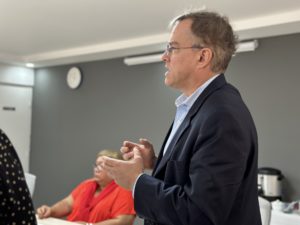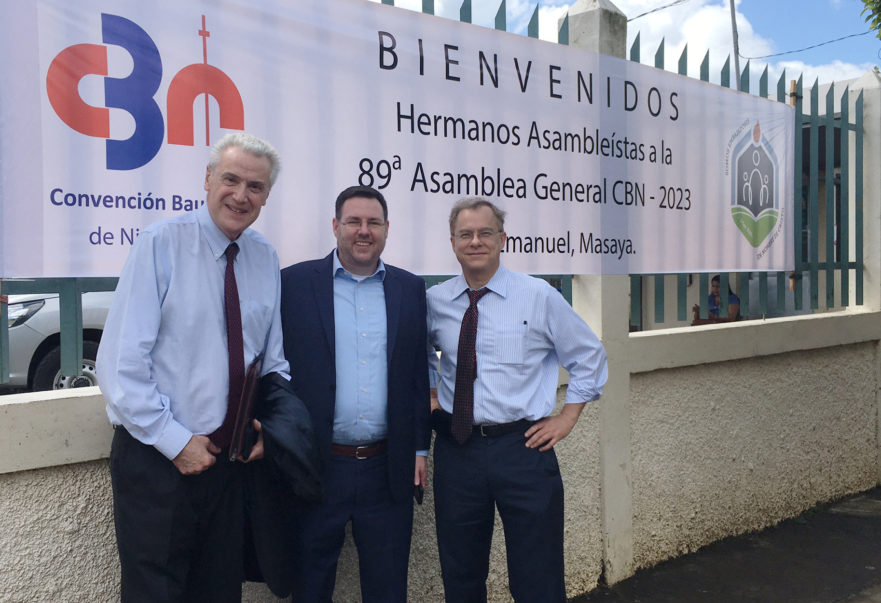January 27, 2023
Nicaragua has been labeled a Country of Particular Concern by the U. S. State Department. From January 4-10, 21Wilberforce’s Executive Director John Gongwer traveled with BWA President Tomas Mackey (Argentina) and BWA General Secretary Elijah Brown to Nicaragua to attend the annual national Baptist Convention—Convención Bautista de Nicaragua (CBN). What follows is Gongwer’s first-hand account of the trip.
We welcomed the invitation of the CBN leadership to visit their country and learn first-hand about the growing religious and political repression in the country and how Baptists and other faith communities are being affected. In addition to participating in the two-day national Baptist convention, we met with Baptist leaders from around the country, visited and spoke with leaders and staff of NBC sponsored schools, their seminary, hospital, radio station, and retirement home. We also spoke with knowledgeable Baptist pastors throughout the country, including indigenous Miskito pastors of churches from the English-based creole language-speaking regions along the Caribbean coast of Nicaragua.
Since the popular unrest and protests began in 2018, the Ortega-Murillo regime has increasingly used violence, harassment, imprisonment, and deportation against religious and political figures and organizations that have spoken out against the regime’s corruption and human rights abuses. In a country with little over 6 million people, hundreds have been killed, thousands beaten, arrested and jailed, and hundreds of thousands have fled or are trying to flee the country.
The Sandinistas originally came to power in 1979 in the popular overthrow of the autocratic government at the time. The Sandinistas, led by Daniel Ortega, led the government until voted out of office in 1990. In 2006 the Sandinistas under Ortega and his wife Rosario Murillo (the powerful Vice President) were voted back into power in a general election, but corruption and political abuses continued to grow until 2018, when the country was wracked by popular unrest and widespread protest and anger. These protests continued until 2020, during which time the government responded and cracked down with brutality and violence against students and other protestors, civic leaders, journalists, faith leaders, and any individuals that were seen as potentially supporting the protests.
In 2022, the government used a variety of financial excuses or procedures to shut down over 1,000 NGOs and other civil society organizations, churches, media and elections monitoring groups that were seen as criticizing or otherwise attempting to hold the government accountable. As the Roman Catholic Church, which represented an estimated 45-50% of the population, was the most outspoken group against the corruption and human rights abuses of the Sandinistas, the Catholic Church has been the primary, although not exclusive, target of the governments’ religious harassment and persecution. Worshippers are intimidated and harassed, churches violently targeted, clergy harassed with arbitrary arrests, death threats, violent attacks, and deportation. Priests and bishops have been jailed.

John Gongwer met with the CBN Board to discuss religious freedom.
We were struck by the general aura of fear and reluctance of most people we met to say anything about the repression or anything at all about the government. The general reaction of most seemed to be a desire to blend anonymously into the gray. This was not surprising, given that most people we spoke to knew people who had been arrested, beaten, harassed, or who had fled the country.
Evangelicals account for approximately more than 30% of the population, and they and other faith groups have also been affected by varying degrees of repression. The Baptists are one of the largest Protestant denominations in Nicaragua, with an estimated 280 churches (228 of which were represented at the January 2023 Annual Convención Bautista de Nicaragua (CBN) gathering) and with an estimated 85,000 members.
Baptist leadership, like those of other faith groups, are split as how to respond to this repression. Many are advocating that the Baptists avoid any perception of political leanings or actions that could antagonize the Sandinistas and perhaps a minority that want the Baptists to take more public stands on social justice and human rights. All are aware of the immediate and costly risks that are involved, and they see daily evidence of what happens to those that the Sandinistas target. To date, the Baptists, with the exception of a few outspoken pastors and activists, have avoided the perception of political positions and thus avoided institutional closures or arrests. The one tangential exception is the government’s appropriation of a technical institute formerly owned by the CBN that had some Baptists members on their governing board. During the 2018 civil unrest, the institute became a staging place for students, faculty, and other protesters demonstrating against the regime. The government subsequently dismissed the school’s leadership and took over the school. The CBN also run what arguably is the second-best hospital in Managua. The hospital’s leadership also ran afoul of the government when it treated for free the wounded of both government security forces and protestors during the government’s violent crackdown.
Going forward, 21Wilberforce will seek to advance freedom of religion or belief in Nicaragua in the following ways:
- Encourage believers and people outside the country to continue to engage with and pray for religious leaders and faith community members in Nicaragua. Many people there feel alone and forgotten in their suffering.
- Continue to report to USCIRF, State Department, and the media on what is happening to all religious groups in the country.
- Find experts who can work with churches and faith leaders to develop responses, defense strategies, and practical implementation plans in the face of government repression.

